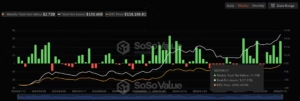In a shocking turn of events, Asian cryptocurrency stocks took a significant dive on February 3, 2023, as Bitcoin fell to $91,163, marking its lowest point in over three weeks. This downturn has prompted widespread concerns over the impact of tariff trade wars that are creating ripples throughout the market.
The Tokyo Stock Exchange witnessed steep losses among major players in the crypto sector. Metaplanet, likened to micro-investment giants like MicroStrategy, closed the trading day at a staggering down 9.44%. Other notable declines included SBI Holdings, which fell by 3.60%, and OSL Group, Hong Kong’s leading licensed crypto exchange, which dipped by 2.69%. Not to be outdone, Boyaa, the largest publicly traded Bitcoin holder in Asia, lost 4.64%.
Market analysts reveal that these pronounced declines are directly linked to fears surrounding international tariffs. Justin d’Anethan, head of sales at Liquifi, explained, “Their pronounced declines are linked to the tariffs, whether you consider the overall stock market’s trade war implications or the effects seen in the crypto downturn. You have an amplification as investors face fears on multiple fronts.” This aligns with the broader market, where Japan’s Nikkei 225 fell 2.66% and Hong Kong’s Hang Seng experienced negligible movement, down just 0.04%.
The market turbulence follows recent trade tariffs imposed by the U.S., with President Trump announcing a 25% tariff on imports from Mexico and Canada, alongside a 10% tariff on China. These developments spurred retaliatory threats from the neighboring countries and set the stage for a potential escalation of a trade war, echoing fears that may impact global markets, including cryptocurrencies.
As traders brace for a challenging trading week ahead, futures tied to three major U.S. stock indexes indicate a rough ride. Analysts suggest that while the immediate downturn may not seem crypto-related, the overarching implications of tariffs hint at a trade war that could trigger widespread sell-offs in risk assets—including Bitcoin and leading altcoins like Ether (ETH).
Interestingly, the crypto market is currently within its traditional Lunar New Year trading window, a period noted for bullish behavior with an 83% success rate historically. However, escalating fears surrounding international tariffs and trade discussions threaten to break Bitcoin’s legendary winning streak associated with this season.
With the market at a precarious juncture, investors will need to stay vigilant. The cascading effects of these tariffs could redefine market dynamics as they unfold. As we move further into February, both traders and investors alike are poised for critical shifts that could shape the future of crypto trading in Asia and beyond.







